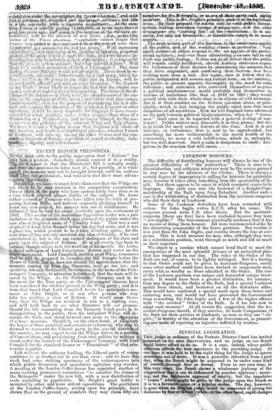LUCKNOW HONOURS.""'"I'l 1 ' 11 '
The difficulty of distributing honours will always be 'one' of the
greatest difficulties of " the authorities." There is sure to be dissatisfaction and criticism whatever may be the course pursued in any case by the advisers of the Crown. There is always a certain degree of impropriety in calling for honours for particular men, because it takes away something from the spontaneity of the gift. But there appear to be cases in which comment ceases to be improper. One such case was the bestowal of a Knight-Com- mandership of the' Bath upon Jung Bahadoor. Another such a case is thewithholding of distinction from the assistant-surgeons who did their dirty at Lucknow. Some of the Lucknow defenders have been; rewarded with. orders. Sir John Inglis writes K:e.II. after his name. The surgeons present write C.B. after theirs. But the assistant- surgeons (there are five) have been excluded because they were " not eligible." The Government practically confesses that it has
no means of doing them honour. All were recommended alike by the discerning commander of the brave garrison. But routine is less just than Sir John Inglis, and. routine draws the line at sur- geons. This is hard measure for Men, who, although they were in a subordinate position went through as Much and did as much as their superiors. We object to a routine which cannot bend itself to meet the emergencies of the most splendid defence pf an unfortified place that has happened in our day. The rules of the Order of the Bath are not, of course, to be lightly infringed. But if a footing in that Order could not be given to Assistant-Surgeons surely some other method. could have been devised to compensate men, every whit as worthy as those admitted to the Order. The ease of the Lucknow garrison was unique and demanded' unique treat- ment. It would have been a greater distinction, for instance, than any degree in the Order of the Bath, had a special Lucknow medal been struck, and bestowed on all the defenders alike. This would have conferred a special mark upon those brave and enduring men, and would not have prevented the Government from rewarding Sir John Inglis and, a few of the higher officers with "the coveted" Order of the Bath. Is it too late now to adopt such measure? At all events the suggestion that the As- sistant-Surgeons should, if they survive, be made Companions of the Bath for their services at Lucknow, as soon as they are "eli- gible," is worthy of the attention of the Government, as present- ing one mode of repairing an injustice inflicted by routine.


























 Previous page
Previous page